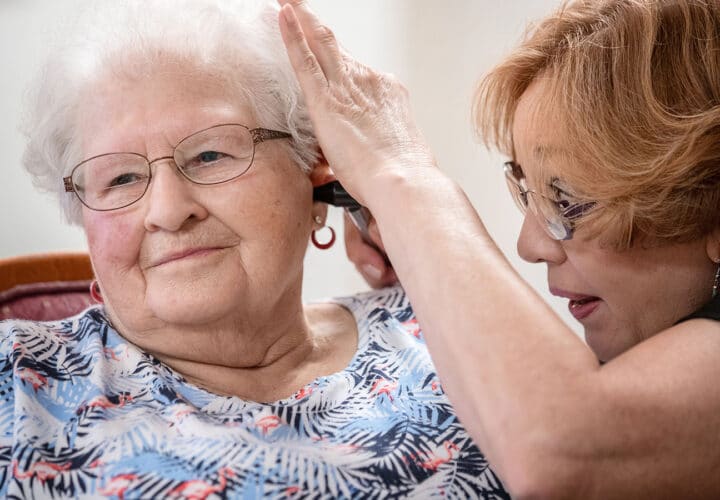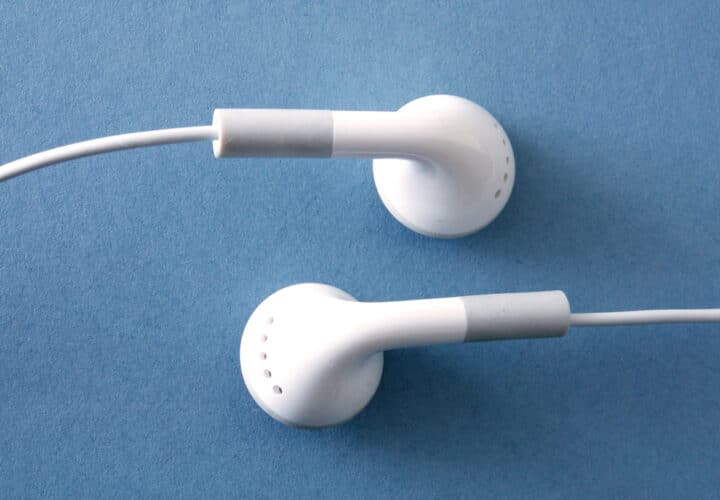Hearing aids are now available over the counter, and that's good news: Studies show they reduce the risk of developing dementia by 19 percent.
Hearing loss is one of the most influential modifiable risk factors for cognitive decline, Alzheimer’s and other forms of dementia. The good news is that there is plenty of evidence that treating hearing loss reduces the risk of developing cognitive decline. As of mid-October 2022, hearing aids are available over-the-counter for mild to moderate hearing loss in the U.S. That means people can now buy them without a prescription.
According to Dr. Sarah A. Sydlowski, the audiology director of the Hearing Implant Program and former president of the American Academy of Audiology, checking for hearing loss is key for healthy brain aging. The most recent evidence suggests that hearing aids could reduce the risk of developing dementia by 19 percent. Since hearing loss leads to a vicious and isolating cycle, Sydlowski recommends visiting an audiologist for advice rather than purchasing a hearing aid on one’s own.
“If you aren’t hearing well, you tend not to participate in those activities that stimulate your brain, through conversation or through challenging listening environments,” Sydlowski told Being Patient. “When you identify hearing loss early and start using appropriate well fitted hearing aids, you’re giving your brain access to those sounds that keep it sharp and keep it active.”
Can treating hearing loss stave off cognitive decline or dementia?
A December 2022 study published in JAMA Neurology — the biggest to date — looked at 137,484 people for up to 25 years. In the short term, people who started using hearing aids showed a small improvement on cognitive tests. Over the long term, people who used hearing aids were 19 percent less likely to develop dementia or other forms of cognitive decline.
“Studies that are just now starting to emerge suggest that if you start using appropriate hearing aids, or cochlear implants, when it’s a more significant hearing loss, you can improve the cognitive decline that you’re experiencing,” Sydlowski added. “So not only can you perhaps help stave it off, you can also help to mitigate it.”
Do you need to do a hearing test to get over-the-counter hearing aids?
While it is possible to buy hearing aids on one’s own without a hearing test, experts say it isn’t recommended.
“You do not have to have a hearing test in order to purchase and use a hearing aid over the counter,” Sydlowski said. “Those devices are really only for people who perceive a mild to moderate difficulty with their hearing.”
The problem is that people generally aren’t very good at figuring out what kinds of sounds they’re hearing. An audiologist could clear blockages caused by earwax or test different aspects of hearing. For example, audiologists could determine that a patient only has trouble focusing on sounds if there is lots of background noise.
According to Sydlowksi, the audiologist might also discover hearing loss is more substantial than previously thought — which means over-the-counter hearing aids may not be enough to do the job. In that case, they will prescribe stronger hearing aids.
What is the difference between a hearing device and a hearing aid?
There are many hearing devices on the market that look like hearing aids but aren’t regulated by the FDA. These inexpensive products often called Peace apps or personal sound amplification devices make the sound louder — but this shouldn’t be confused with a good (and safe) hearing aid, according to Sydlowski.
“Even though it looks like a hearing aid, it might not be,” Sydlowski warned.
While pricier, hearing aids come with more sophisticated — and important — features, Sydlowski explained: features that automatically reduce background noise so the wearer can focus on speech and even adjust individual pitches based on their hearing. This means that the hearing devices also address the hearing range — the different types of sounds a person is able to hear.
The differences in features also contributes to the price differences between different types of hearing aids as well.
Does insurance pay for hearing aids?
Although hearing aids for mild to moderate hearing loss are available over-the-counter, hearing aids aren’t always insured.
“Regular Medicare Part B does not cover hearing aids,” Sydlowski said. “They do typically cover a diagnostic hearing test, provided that it’s not received for the purpose of fitting hearing aids.”
Coming in for a routine hearing test rather than the purpose of fitting hearing aids, a diagnostic test could be covered by insurance. That means the hearing test is done with the purpose of understanding what caused a change in hearing or to determine the best course of action for treating hearing loss. Private insurance plans like Medicare Advantage sometimes provide coverage according to Sydlowski.
What is the difference between a $100 and a $500 hearing aid?
Anytime a person go shopping around for a new gizmo, laptop, or other gadgets price considerations are always important. For hearing aids, understanding how they’re priced goes a long way toward helping both patient and audiologist make the right decision.
“In some practices, the cost of the device is bundled with the services that the provider delivers,” Sydlowski said, adding that this could include batteries, warranties and other repairs. On the other hand, some hearing aids aren’t bundled so the price is just the cost of the device. This is one factor that explains the price discrepancies.
But is a $500 device always better than a $100 device?
“There are effective devices at many price points so I don’t think that finances should be a barrier to exploring the options that are out there,” she said. An audiologist can help patients navigate the landscape of different hearing aids to figure out which one is best based on hearing problems as well as financial concerns, she added.
The bottom line: If you’re concerned, don’t wait to get your hearing checked
Getting hearing aids isn’t just about mitigating future risk of other issues: According to Sydlowski said, hearing aids are about immediate benefits. They can improve a person’s hearing range, make sound louder, and make it easier to focus on conversations in a busy setting.
“I would say by the age of 50, if you haven’t already had your hearing tested at least once and then periodically thereafter,” Sydlowski said. Additionally, she said, there are a few other other reasons one might seek out the expert opinion of an audiologist:
- Ringing in one’s ears
- Feeling like people are mumbling
- Inability to make out the conversation in noisy restaurants
- Finding oneself consistently turning up the volume on the phone or TV
If a person is concerned about their hearing, Sydlowski said, don’t wait to check in with an expert about it.




